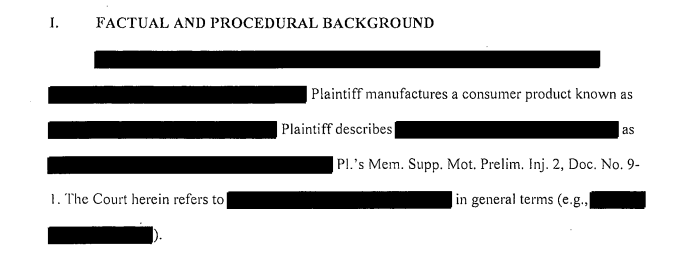Court Rules That Companies Can’t Litigate In Secret Just To Protect Reputation

It doesn’t take very long to read the court documents in Company Doe’s lawsuit against CPSC, since most of it is redacted.
For those coming late to the game, here’s the quick version: SaferProducts.gov is a Congressionally mandated database set up by the CPSC that not collects and makes public safety-related complaints about consumer products. Just like the database run by the National Highway Traffic Safety Administration, it gives businesses the opportunity to examine and respond to reports submitted to the site.
In this case, Company Doe made some sort of product (even the nature of the product is redacted in the court documents) that received a complaint or complaints on the CPSC database. Company Doe then claimed that some statement (or statements) in these complaint (or complaints) were materially inaccurate.
After some discussions with Company Doe, CPSC redacted some of what had been posted to the database. That wasn’t enough to satisfy Doe, which then filed suit against the CPSC and its then-chair, Inez Tenenbaum.
But rather than use the public forum of a lawsuit to make its case and clear its name, Company Doe convinced a court to hide every material fact about the case — the company’s name, location, the type of product, its brand name, the names of all individuals involved — so that the entire matter has so far been litigated behind a steel door of secrecy.
Advocacy groups, including our colleagues at Consumers Union, petitioned the court in 2012 to unseal this information, but the court denied that request. Even the groups’ objection to the sealing was kept under wraps by the court.
In response to today’s ruling, Ami Gadhia, senior policy counsel for Consumers Union, called the decision “a big win for consumers.” She added, “It sends the right message. If a company sues to keep its name out of the complaint database, it can’t use the courts to hide its identity from the public. The decision also underscores the importance of this critical database, which was created for people to report unsafe products after a flood of recalls” of dangerous and faulty items.
In Dec. 2012, the groups, led by Public Citizen, took their case to the 4th Circuit Court of Appeals, which finally heard arguments in the case last fall.
After months of waiting, the court has finally issued its decision [PDF], siding with the advocates and ordering the lower court to unseal the records.
“It is well settled that the public and press have a qualified right of access to judicial documents and records filed in civil and criminal proceedings,” writes the court in its opinion. “The right of public access springs from the First Amendment and the common-law tradition that court proceedings are presumptively open to public scrutiny.”
Continues the court, “A corporation very well may desire that the allegations lodged against it in the course of litigation be kept from public view to protect its corporate image, but the First Amendment right of access does not yield to such an interest… A corporation may possess a strong interest in preserving the confidentiality of its proprietary and trade-secret information, which in turn may justify partial sealing of court records. We are unaware, however, of any case in which a court has found a company’s bare allegation of reputational harm to be a compelling interest sufficient to defeat the public’s First Amendment right of access.”
The appeals panel takes issue with the lack of justification for the lower court’s decision to allow Company Doe to litigate anonymously.
“The district court made no specific findings explaining how the information sealed in this case would harm Company Doe’s reputation, and Company Doe does not point us to any evidence that buttresses the district court’s conclusion,” reads today’s opinion. “After scouring the record on appeal, we find no credible evidence to support Company Doe’s fear that disclosure of the challenged report of harm and the facts of this case would subject it to reputational or economic injury, particularly in light of the fact that the district court’s entry of judgment in favor of Company Doe vindicated the company and its product.”
“The Fourth Circuit sent a strong message today that corporations that turn to the courts must accept that public access to the proceedings is part of going to court in an open and democratic society,” said Scott Michelman, the Public Citizen attorney handling the case. “The ruling is a complete victory for consumers and a strong vindication of the First Amendment imperative to conduct litigation in the open.”
Want more consumer news? Visit our parent organization, Consumer Reports, for the latest on scams, recalls, and other consumer issues.

